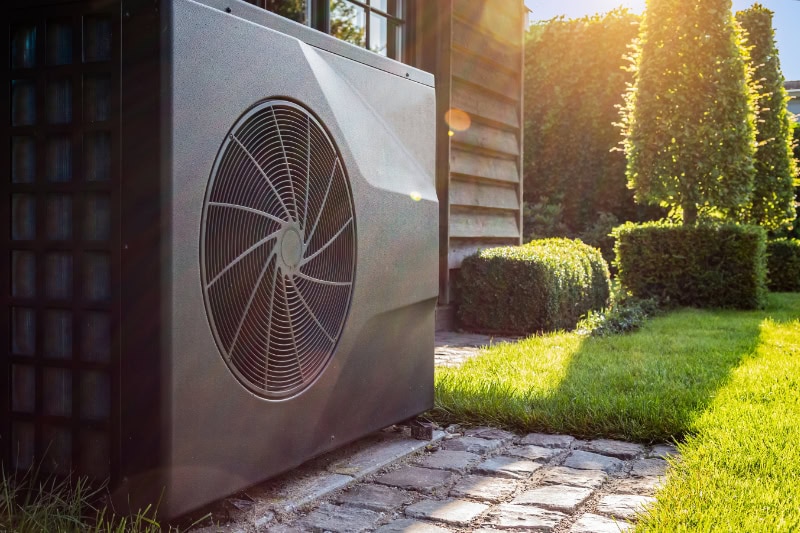Transitioning Your Heat Pump

One reason Michigan homeowners love heat pumps is they function as an all-in-one unit. Instead of purchasing and maintaining a separate furnace and air conditioning system, you can simply transition your heat pump from the heat setting to the cooling setting and vice versa as seasons warrant.
Our North Winds Heating & Cooling team wants you to understand how to make this transition safely and effectively.
How a Heat Pump Works
Instead of generating heat by burning a fuel like natural gas, a heat pump simply moves the heat from one location to another. Essentially, it operates just like an air conditioner but has the capability to perform the action in both directions.
Air conditioners do not create cooled air. Instead, a constantly moving refrigerant absorbs heat from inside your home, pumps it to the outdoor unit, and releases the heat outside. The result is a lower indoor temperature. A heat pump can work as an air conditioner in the summer.
During the winter, the heat pump takes heat from the outside air, which is possible even in cold outdoor temperatures, and releases that heat inside your home to warm your East Lansing living space.
According to the US Department of Energy (DOE), a heat pump can reduce your electricity by up to 50 percent over conventional furnace systems, saving you in energy costs.
Homeowner Maintenance To-Do List
As a homeowner, the transition seasons of spring and fall are the perfect times to conduct some basic heat pump maintenance. These simple steps will help ensure your system is ready for the upcoming season.
First, replace your air filter. Most filters should be replaced every three to six months. This can help improve your heat pump’s efficiency and operation as well as your home’s indoor air quality. Then, take a look at the outside unit and be sure you cut down and remove weeds or other growth within two or three feet, so your heat pump has plenty of air circulation.
It’s a good idea to clean your coils before winter arrives, because the cold weather makes it much harder. Also, flush and clean out your drain line and prime the trap if needed. If your heat pump uses electric heat, look for any wire damage or discoloration.
Finally, check your thermostat settings and adjust them for winter weather.
Professional Maintenance To-Do List
If you’ve completed your homeowner checklist for transitioning your heat pump, it’s time to call in our professionals for a biannual check. Our heating, ventilation, and air conditioning (HVAC) team will provide a complete inspection, cleaning, and tune-up at an affordable price that will ultimately save you stress, time, and money on repairs later in the season.
A professional should check and adjust refrigerant levels in your heat pump. Only a professional can add coolant and repair leaks correctly.
If you noticed any potential electrical problems, a trained technician can repair exposed wiring or loose connections. Your blower motor should be oiled, and its wheels should be inspected for balance. Finally, your evaporator coils should be checked and cleaned during this visit.
Protect Your Heat Pump During Shoulder Seasons
When nights tend to be cold and days warmer during spring and autumn, it can get tricky to use your heat pump effectively. In some cases, switching between the heating and air conditioning modes can lead to an overworked system and related problems.
Your heat pump uses a great deal of energy to turn on and off, and switching constantly between heating and cooling can result in short-cycling types of issues like tripping the circuit breaker.
If your heat pump is in air conditioner mode, and your thermostat is set to cooling, your outdoor condensing unit will be working. If the set-point temperature is set higher to turn off the cooling function and then moved lower due to a need for heat, it can lock up the compressor. The same problem can occur in heating mode as well.
Some heat pumps incorporate a digital thermostat or an anti-short-cycling trigger to prevent this problem. However, you can also be sure you give your system a five-minute break if you’re switching between cooling and heating frequently during the shoulder seasons.
Call Us With Any Heat Pump Needs
When you’re ready for your professional maintenance service call on your heat pump, contact North Winds Heating & Cooling in East Lansing, Michigan, to schedule an appointment. We’d be happy to come out to perform a comprehensive inspection, cleaning, and tune-up. Or if you find you need a repair or replacement, we will help you there as well. Call 517-225-3430 or request service online today.
